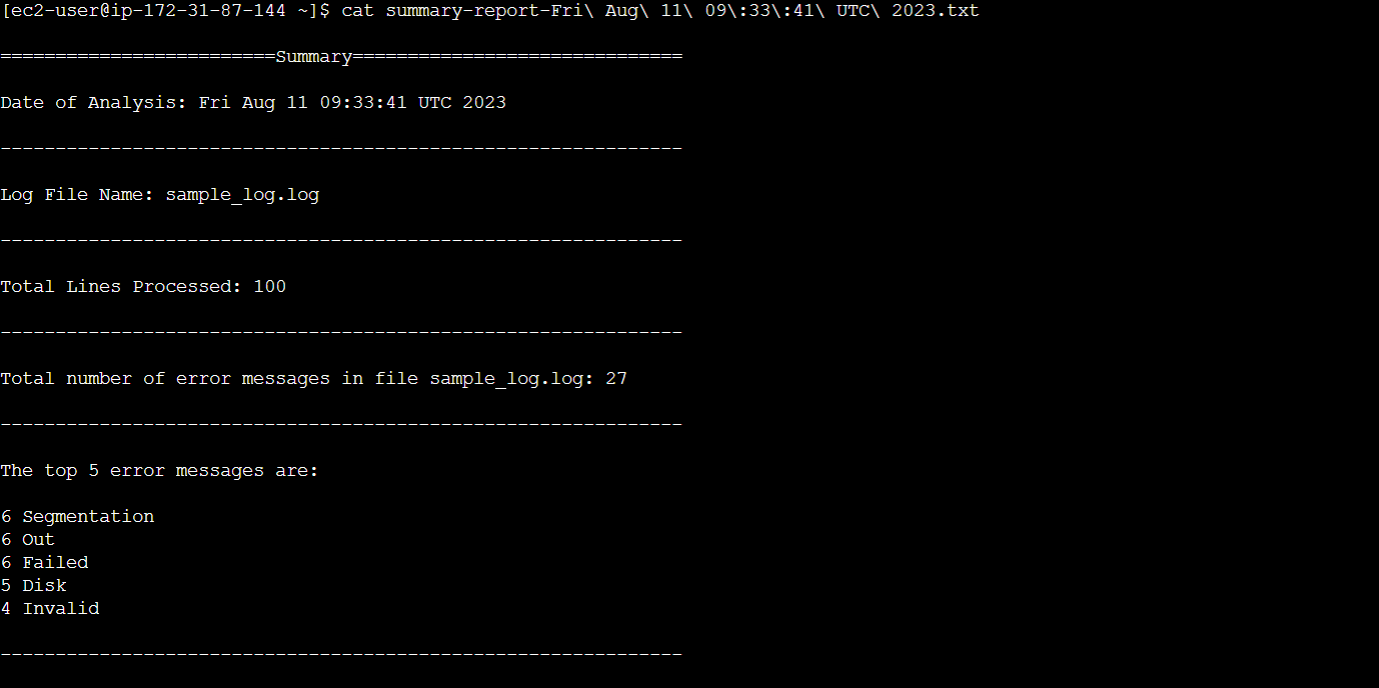Day 5: Log Analysis With Bash - #TWSBashBlazeChallenge🚀
 Gauri Shirkande
Gauri Shirkande
🌟 Introduction
Welcome back to Day 5 of BashBlazeChallenge! In this blog, we will create a Bash script that will act as a log analyzer and generate a report. As sysadmins, we come across many situations where we need to analyze log files, identify specific events, and generate a summary report. This log analyzer created using bash will help us in automating the process of analysis. So let's get started!
📜 Script Features and Implementation
Input: The script should take the path to the log file as a command-line argument as shown below.
./log_analyzer.sh /path/to/log_fileError Count: The script should analyze the log file and count the number of error messages that can be identified by a specific keyword (e.g., "ERROR" or "Failed"). It is expected that we print the total error count. Let's implement this feature using the script below:
#!/bin/bash # Function is used to count the number of error messages function count_error_msgs() { file_name="$1" # Checks whether the file exists if [ -f "$file_name" ]; then # Use grep to match the entered text with the text in file # -c is used to count the matched text # -i stands to make the match case insensitive error_count=$(grep -c -i "ERROR" "$file_name") echo "Total number of error messages in file $file_name: $error_count" else echo "Error: File does not exist!" exit 1 fi } count_error_msgs "$1"Critical Events: Search for lines containing the keyword "CRITICAL" and print those lines along with the line number.
function print_critical_lines() { file_name="$1" echo echo "The CRITICAL lines along with their line numbers are as follows: " echo if [ -f "$file_name" ]; then # -n in grep command returns the number of lines matching the given text # The mapfile command reads lines of input into an array variable # -t is used to remove the unwanted newline trailing characters mapfile -t critical_events < <(grep -n -i "CRITICAL" "$file_name") for i in "${critical_events[@]}"; do echo "$i" done else echo "Error: File not found..." exit 1 fi } print_critical_lines "$1"Top Error Messages: Now the script should identify the top 5 most common error messages and display them along with their occurrence count. Let's do it.
function display_top_error_messages() { file_name="$1" if [ -f "$file_name" ]; then declare -A error_msgs while IFS= read -r line; do error_msg=$(awk '{printf $4}' <<< "$line") ((error_msgs["$error_msg"]++)) done < <(grep -i "ERROR" $file_name) echo echo "The top 5 error messages are: " echo for msgs in "${!error_msgs[@]}"; do echo "${error_msgs[$msgs]} $msgs" done | sort -rn | head -n 5 else echo "Error: File not found..." fi } display_top_error_messages "$1"Summary Report: Now, that we have completed all the above functions, we need to generate a summary report in a separate text file. The report should include:
Date of analysis
Log file name
Total lines processed
Total error count
Top 5 error messages with their occurrence count
List of critical events with line numbers
#Main script
summary_report="summary-report-$(date).txt"
{
echo -e "\n=========================Summary=============================="
echo -e "\nDate of Analysis: $(date)"
echo -e "\n--------------------------------------------------------------"
echo -e "\nLog File Name: $1"
echo -e "\n--------------------------------------------------------------"
echo -e "\nTotal Lines Processed: $(wc -l < "$1")"
echo -e "\n--------------------------------------------------------------"
count_error_msgs "$1"
echo -e "\n--------------------------------------------------------------"
display_top_error_messages "$1"
echo -e "\n--------------------------------------------------------------"
print_critical_lines "$1"
echo -e "\n--------------------------------------------------------------"
} > "$summary_report"
✅Fully Functional Script!
#!/bin/bash
# Function is used to count the number of error messages
function count_error_msgs() {
file_name="$1"
# Checks whether the file exists
if [ -f "$file_name" ]; then
# Use grep to match the entered text with the text in file
# -c is used to count the matched text
# -i stands to make the match case insensitive
error_count=$(grep -c -i "ERROR" "$file_name")
echo -e "\nTotal number of error messages in file $file_name: $error_count"
else
echo -e "\nError: File does not exist!"
exit 1
fi
}
function print_critical_lines() {
file_name="$1"
echo
echo -e "\nThe CRITICAL lines along with their line numbers are as follows: "
echo
if [ -f "$file_name" ]; then
mapfile -t critical_events < <(grep -n -i "CRITICAL" "$file_name")
for i in "${critical_events[@]}"; do
echo "$i"
done
else
echo -e "\nError: File not found..."
exit 1
fi
}
function display_top_error_messages() {
file_name="$1"
if [ -f "$file_name" ]; then
declare -A error_msgs
while IFS= read -r line; do
error_msg=$(awk '{printf $4}' <<< "$line")
((error_msgs["$error_msg"]++))
done < <(grep -i "ERROR" $file_name)
echo
echo -e "The top 5 error messages are: "
echo
for msgs in "${!error_msgs[@]}"; do
echo "${error_msgs[$msgs]} $msgs"
done | sort -rn | head -n 5
else
echo "Error: File not found..."
fi
}
#Main Script
if [ "$#" -eq 0 ]; then
echo "Usage $0: Pass the log file as an argument you want to analyze!"
exit 1
fi
summary_report="summary-report-$(date).txt"
{
echo -e "\n=========================Summary=============================="
echo -e "\nDate of Analysis: $(date)"
echo -e "\n--------------------------------------------------------------"
echo -e "\nLog File Name: $1"
echo -e "\n--------------------------------------------------------------"
echo -e "\nTotal Lines Processed: $(wc -l < "$1")"
echo -e "\n--------------------------------------------------------------"
count_error_msgs "$1"
echo -e "\n--------------------------------------------------------------"
display_top_error_messages "$1"
echo -e "\n--------------------------------------------------------------"
print_critical_lines "$1"
echo -e "\n--------------------------------------------------------------"
} > "$summary_report"
mv "$1" analyzed_files
Instructions:
Create a file named log_analyzer.sh using:
touch log_analyzer.shAfter this, add the above content to this log_analyzer.sh
Make the file executable using:
chmod +x log_analyzer.shThen execute the script by passing a log file name as an argument.
./log_analyzer.sh sample_log.log
📊Resulting Output📋
After execution of the above script, a report is generated.

The report looks something like this:


📝Conclusion✨
In this way, we successfully created a bash script that analyzed the respective log file and also generated a summary report for the analysis. This tool will definitely help the DevOps Engineers and System Administrators for Log Analysis and Report Generation.
Hope you found this blog helpful and informative! 🌟
Keep learning and keep exploring! 🚀
Subscribe to my newsletter
Read articles from Gauri Shirkande directly inside your inbox. Subscribe to the newsletter, and don't miss out.
Written by
